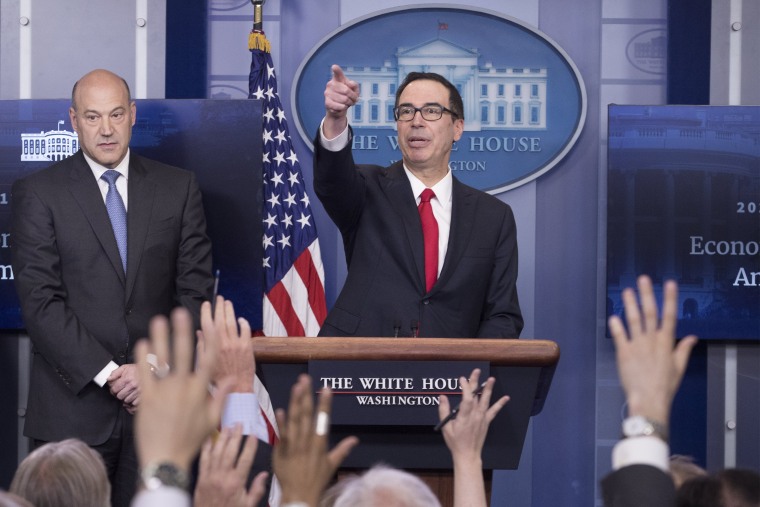Yesterday afternoon, Senate Republicans voted on a procedural measure to bring their tax plan to the floor, setting the stage for a final vote that will likely come tomorrow. At the time, GOP senators advanced the legislation without a score from the Joint Committee on Taxation, without legislative text on the "trigger" provisions, without understanding the details of changes to state-and-local-tax deductions, without Byrd Rule scrutiny, and without the benefit of a single substantive policy hearing.
In other words, with Congress poised to overhaul the federal tax code of the world's most dominant economic superpower, Republican lawmakers are effectively winging it, legislating while blindfolded, hoping it'll all work out in the end.
The Washington Post's E.J. Dionne joked yesterday, "Most Americans take far more care in filling out their tax returns than Republicans are taking with this bill."
What's more, while Republicans are confronted with brutal analyses of their plan from official and independent economists, GOP policymakers can't pushback against them -- because Treasury Secretary Steve Mnuchin and his team haven't prepared an official Trump administration analysis.
Mr. Mnuchin has promised that Treasury will release its analysis in full. Yet, just one day before the full Senate prepares to vote on a sweeping tax rewrite, the administration has yet to produce the type of economic analysis that it is citing as a reason to pass the tax cut.Those inside Treasury's Office of Tax Policy, which Mr. Mnuchin has credited with running the models, say they have been largely shut out of the process and are not working on the type of detailed analysis that he has mentioned. An economist at the Office of Tax Analysis, who spoke on the condition of anonymity so as not to jeopardize his job, said Treasury had not released a "dynamic" analysis showing that the tax plan would be paid for with economic growth because one did not exist.
There is no defense for trying to craft major national policy this way. When the Trump administration's own Office of Tax Policy gets "largely shut out of the process" of scrutinizing the Trump administration's preferred tax plan, we're witnessing policy madness.
The New York Times' article quoted a Treasury official saying the cabinet department won't have time to produce a full analysis of the final bill before Republicans vote on it.
Common sense suggests Congress could simply wait for detailed information before voting to overhaul the nation's tax code, but that would undermine the two pillars of the GOP leadership's strategy: stealth and speed.
After all, trying to legislate with more information might lead more Americans to learn what Congress is up to -- and Republicans have decided that simply isn't an option.
As a consequence, in a rather literal sense, GOP senators don't really know what they're prepared to vote on. Senate Majority Whip John Cornyn (R-Texas) this week made an argument about his party's plan as it relates to a child-care tax credit that was plainly and demonstrably false. The Washington Post asked several senators yesterday about their plan benefiting the wealthiest Americans, and several Senate Republicans responded in a way that suggested they're still confused about the basics of the debate.
In other words, the GOP tax plan isn't just a bad idea; it's also a bad idea that its own proponents don't understand and aren't eager to study.
It would be very easy right now for responsible lawmakers to tap the breaks, take a breath, and recommend a detailed hearing or two about exactly what's on the table. The fact that this won't even be considered is emblematic of the deteriorating condition of American policymaking under Republican rule.
